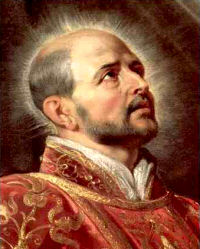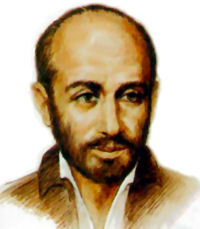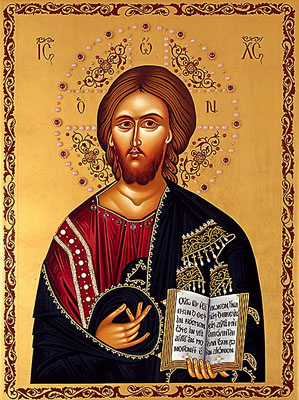Saint Ignatius of Loyola, Priest
Memorial
July 31st
(1491-1556, Canonized 1622)
Founder of the Society of Jesus (Jesuits)

Saint Ignatius of Loyola, engraving, French (1844) copy of 17th century portrait. (Private collection.)
Ad Majoriem Dei Gloriam
To the greater glory of God
Ignatius was born in the Basque region of Spain in 1491, the youngest of thirteen children. He was brought up in the household of Juan Velásquez de Cuellar, treasurer to Ferdinand and Isabella, and served as his patron's page. He was said to be affected and extravangant about his hair and dress, consumed with the desire of winning glory, and sometimes involved in intrigues.
In 1517 a change for the better began; Velásquez died and Ignatius joined the Spanish army. The turning-point of his life came in 1521 when he was injured in battle. While the French were besieging the citadel of Pampeluna, a cannon ball, passing between Ignatius's legs, tore open the left calf, and broke the right shin . The garrison surrendered, but Ignatius was well treated by the French and carried on a litter to Loyola, where his leg had to be rebroken and reset, and afterwards a protruding end of the bone was sawn off, and the limb, having been shortened by clumsy setting, was stretched out by weights. All these pains were undergone without complaint. But the aftermath was so severe he nearly died. On the eve of the Feast of Saints Peter and Paul (June 29), the crisis was passed, and he began to recover.
Until then, Ignatius had shown only the ordinary virtues of the Spanish officer. His dangers and sufferings had doubtless done much to purge his soul, but there was no idea yet of remodelling his life on any higher ideals. During the weary hours of convalescence, he asked for the romances of chilvary, his favorite reading. As there were none in the castle, and instead they brought him the lives of Christ and of the saints, and he read them in the same quasi-competitive spirit with which he read the achievements of knights and warriors.
"Suppose I were to rival this saint in fasting, that one in endurance, that other in pilgrimages." He would then wander off into thoughts of chivalry, and service to fair ladies, especially to unknown lady of high rank. But he soon realized that the worldly omantic daydreams left him dissatisfied, while the heavenly ones grew clearer and dearer.
One night as he lay awake, pondering those new lights, his autobiography says, he "saw clearly the image of Our Lady with the Holy Child Jesus, at whose sight for a notable time he felt a surpassing sweetness, which eventually left him with such a loathing for his past sins, and especially for those of the flesh, that every unclean imagination seemed blotted out from his soul, and never again was there the least consent to any carnal thought"
His conversion was now complete. He set out on a pilgrimage to Jerusalem, and dedicated himself at the monastery of Montserrat. He stopped for a time at Manresa, where he wrote in his journal, and there he became aware of "interior things, like humility, charity, patience and discretion." He began to write the "Spiritual Exercises", a guide for a month of prayer. He resumed the pilgrimage in early 1523, and arrived in Jerusalem in September. However, he was not permitted to stay there, so he returned to Barcelona, where he began to preach on the streets, and to study Latin. He encountered difficulties with the Inquisition, so he went to study at the University of Paris.
He met Francis Xavier in Paris. Ignatius, Francis and five other students, began to do the Spiritual Exercises. Together the men took private vows at a small chapel atop Montmartre on the Feast of the Assumption of Mary, August 15, 1534.
After an unsuccessful attempt to go to Jerusalem as missionaries, the men, calling themselves the Compania de Jesus (Society of Jesus) went to Rome and put themselves at the disposal of the Pope. Their rule of common life was approved by Pope Paul II September 27, 1540, and Ignatius, as superior of the new religious order, governed, recruited, and wrote many letters. He completed writing the Jesuit Constitutions in 1551. Soon the Society was established in Spain, Portugal, France, the Low Countries, and Germany. Jesuit missionaries were sent to Africa, India and North and South America.
Ignatius died of a fever on July 31, 1556. There were at least one thousand Jesuits at the time of their founder's death.
Ignatius is buried in the Church of the Gésu in Rome, at the center of Jesuit instutions of education and formation to this day. The establishment of Jesuit schools and universities was a key effort of the Counter-reformation, and Jesuit missions were established throughout the world. He was canonized, along with Francis Xavier, in 1622 by Pope Gregory XV.
The motto of the Society of Jesus is Ad Majorem Dei Gloriam - To the Greater Glory of God.
(Principal source - Catholic Encyclopedia - 1913 edition)
***
Collect:
O God, who raised up Saint Ignatius of Loyola in your Church
to further the greater glory of your name,
grant that by his help we may imitate him
in fighting the good fight on earth
and merit to receive with him a crown in heaven.
Through our Lord Jesus Christ, your Son,
who lives and reigns with you in the unity of the Holy Spirit,
one God, for ever and ever. +Amen.
First Reading: 1 Corinthians 10:31 - 11:1
So, whether you eat or drink, or whatever you do, do all to the glory of God. Give no offense to Jews or to Greeks or to the Church of God, just as I try to please all men in everything I do, not seeking my own advantage, but that of many, that they may be saved. Be imitators of me, as I am of Christ.
Gospel Reading: Luke 14: 25-33
Now great multitudes accompanied Him; and He turned and said to them, "If any one comes to me and does not hate his own father and mother and wife and children and brothers and sisters, yes, and even his own life, he cannot be my disciple. Whoever does not bear his own cross and come after me, cannot be my disciple. For which of you, desiring to build a tower, does not first sit down and count the cost, whether he has enough to complete it? Otherwise, when he has laid a foundation, and is not able to finish, all who see it begin to mock him, saying, 'This man began to build, and was not able to finish.' Or what king, going to encounter another king in war, will not sit down first and take counsel whether he is able with ten thousand to meet him who comes against him with twenty thousand? And if not, while the other is yet a great way off, he sends an emissary and asks terms of peace. So therefore, whoever of you does not renounce all that he has cannot be my disciple."
***
The First Principle and Foundation
The goal of our life is to live with God forever.
God who loves us, gave us life.
Our own response of love allows God's life to flow into
us without limit.
All the things in this world are gifts of God,
presented to us so that we can know God more easily
and make a return of love more readily.
As a result, we appreciate and use all of these gifts of God
insofar as they help us develop as loving persons.
But if any of these gifts become the center of our lives,
they displace God
and so hinder our growth toward our goal.
In everyday life, then, we must hold ourselves in balance
before all of these created gifts insofar as we have a choice
and are not bound by some obligation.
We should not fix our desires on health or sickness,
wealth or poverty, success or failure, a long life or short one.
For everything has the potential of calling forth in us
a deeper response to our life in God.
Our only desire and our one choice should be this:
I want and I choose what better
leads to the deepening of God's life in me.
--St. Ignatius, from the beginning of the Spiritual Exercises
***
Take, Lord, and Receive
Take, Lord, and receive all my liberty, my memory,
my understanding, and my entire will.
All I have and call my own.
Whatever I have or hold, you have given me.
I return it all to you and surrender it wholly
to be governed by your will.
Give me only your love and your grace
and I am rich enough and ask for nothing more.
--St. Ignatius, from the end of the Spiritual Exercises
***
Prayer of Saint Ignatius Loyola
Teach us, Good Lord,
To Serve Thee as Thou deservest;
To give and not to count the cost;
To fight and not to heed the wounds;
To labor and not to ask for any reward,
save that of knowing that we do Thy will.
Through Jesus Christ Our Lord, Amen.
***




